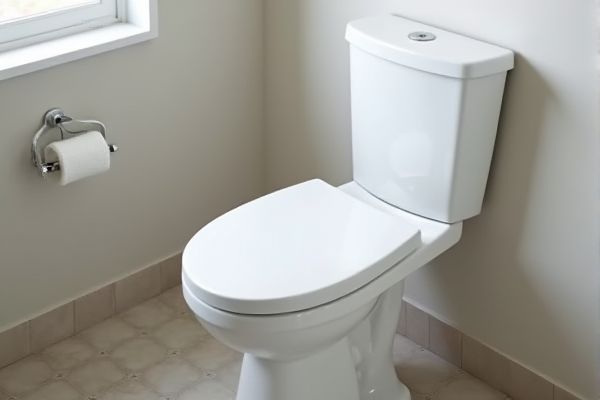
Soft-close toilet seats feature a gentle, quiet closing mechanism that prevents slamming and reduces wear, while standard toilet seats typically close with a louder, faster drop that can cause noise and damage over time. Discover the benefits of choosing the right toilet seat for your bathroom by reading the rest of the article.
Table of Comparison
| Feature | Soft-Close Toilet Seat | Standard Toilet Seat |
|---|---|---|
| Closing Mechanism | Slow, controlled closing | Manual, quick closing |
| Noise Level | Silent or minimal noise | Loud, audible noise |
| Durability | Higher with shock-absorbing hinges | Standard durability |
| Safety | Prevents finger pinching | Higher risk of pinching |
| Price Range | Typically $20-$50 | Typically $10-$25 |
| Installation | Simple, similar to standard seats | Simple, standard screws |
| Maintenance | Occasional hinge lubrication | Minimal maintenance |
| Common Materials | Plastic, wood with soft-close hinges | Plastic, wood |
Introduction: Soft-Close vs Standard Toilet Seats
Soft-close toilet seats feature a hydraulic hinge mechanism that prevents slamming, offering a quieter and safer bathroom experience compared to standard toilet seats. Standard toilet seats typically lack this technology, leading to louder impacts and increased wear over time. Choosing a soft-close seat can enhance bathroom comfort and prolong the lifespan of your toilet components.
What Is a Soft-Close Toilet Seat?
A soft-close toilet seat features a hinge mechanism that allows the seat and lid to close slowly and quietly, preventing slamming and reducing noise. Unlike standard toilet seats that drop quickly and can cause damage or wear over time, soft-close seats provide enhanced durability and safety by minimizing impact. This design improves user comfort and protects bathroom fixtures, making it a popular upgrade for modern bathrooms.
What Is a Standard Toilet Seat?
A standard toilet seat typically features a simple hinge mechanism that allows the seat and lid to be lifted and lowered manually without any damping or slow-close function. This design often results in the lid and seat dropping quickly, potentially causing loud noise and wear over time. Standard toilet seats are usually more affordable and easier to replace but lack the quiet, controlled closing mechanism found in soft-close models.
Key Differences Between Soft-Close and Standard Seats
Soft-close toilet seats feature a hydraulic hinge mechanism that allows the seat and lid to close slowly and quietly, preventing slamming and reducing wear and tear. Standard toilet seats typically rely on simple plastic hinges, resulting in faster, noisier closures and a higher risk of damage over time. Your bathroom experience improves with soft-close seats by enhancing durability and minimizing noise disruptions.
Noise Reduction: Soft-Close Advantage
Soft-close toilet seats significantly reduce noise by preventing the loud slamming typical of standard toilet seats, providing a quieter bathroom experience. Equipped with hydraulic hinges, soft-close seats control the descent speed, ensuring a gentle, silent close. This feature enhances comfort and minimizes disturbances, especially during nighttime use or in shared living spaces.
Safety and User Experience
Soft-close toilet seats enhance safety by preventing sudden slamming, reducing the risk of finger injuries and damage to the toilet. They offer a quieter and smoother user experience, ideal for households with children or elderly individuals. Standard toilet seats may lack these safety features, often leading to quicker wear and less comfort during use.
Installation & Compatibility
Soft-close toilet seats typically feature standard mounting hardware compatible with most toilet bowls, enabling straightforward installation without specialized tools. Unlike some standard seats that may require additional adjustments or replacements of bolts, soft-close seats often include universal hinges designed for quick attachment. Ensuring compatibility involves verifying the bolt spread and seat shape, with soft-close models offering flexible configurations for round or elongated toilets.
Durability and Maintenance
Soft-close toilet seats feature durable hinges made from high-quality materials like stainless steel or zinc alloy, reducing wear and extending lifespan compared to standard plastic hinges. Their slow-closing mechanism prevents slamming, minimizing damage and the need for frequent repairs or replacements. Standard toilet seats often require regular tightening and maintenance due to loose or noisy hinges, while soft-close models maintain stability and require less upkeep over time.
Price Comparison
Soft-close toilet seats typically cost between $25 and $75, making them moderately more expensive than standard toilet seats, which generally range from $10 to $30. The higher price for soft-close models reflects their advanced damping mechanisms designed to prevent slamming and extend durability. Investing in a soft-close seat can reduce maintenance and replacement costs over time due to its enhanced build quality and noise reduction features.
Which Toilet Seat Should You Choose?
Soft-close toilet seats feature a slow-closing mechanism that prevents slamming, reducing noise and minimizing wear on both the seat and toilet bowl. Standard toilet seats lack this feature, often closing quickly and noisily, which may lead to faster deterioration. Choosing a soft-close toilet seat enhances durability and comfort, making it a preferred option for modern bathrooms focused on convenience and longevity.
 homyna.com
homyna.com